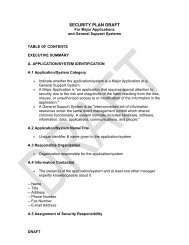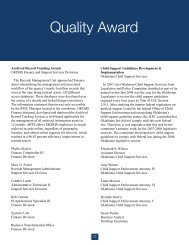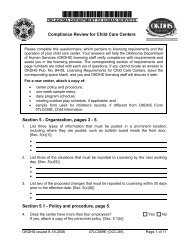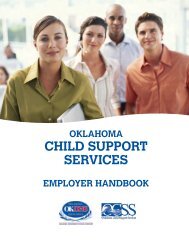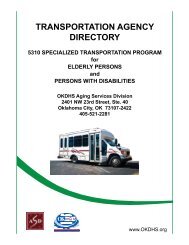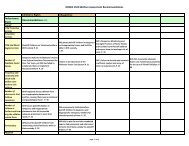The Oklahoma Pinnacle Plan - Oklahoma Department of Human ...
The Oklahoma Pinnacle Plan - Oklahoma Department of Human ...
The Oklahoma Pinnacle Plan - Oklahoma Department of Human ...
You also want an ePaper? Increase the reach of your titles
YUMPU automatically turns print PDFs into web optimized ePapers that Google loves.
<strong>The</strong> <strong>Oklahoma</strong> <strong>Pinnacle</strong> <strong>Plan</strong>:<br />
An Improvement <strong>Plan</strong> for Child Welfare Services<br />
APPENDICES<br />
March<br />
2012<br />
Communication<br />
Communication strategies are being identified to ensure full integration <strong>of</strong> a trauma-informed child<br />
welfare system. <strong>The</strong> Statewide Steering Committee consists <strong>of</strong> partners and representatives from the<br />
CTISP and has a focus on overall transformation <strong>of</strong> the <strong>Oklahoma</strong> Child Serving System.<br />
<strong>The</strong> Statewide Steering Committee serves as the review and development body for the quarterly<br />
Trauma-Informed Care Newsletter. <strong>The</strong> inaugural newsletter was released in November 2011. <strong>The</strong> next<br />
newsletter has a target release date <strong>of</strong> March 2012 with quarterly editions due June 2012, September<br />
2012 and December 2012. <strong>The</strong> Newsletter will serve as a vehicle for providing the statewide perspective<br />
on system transformation and movement toward being trauma-informed. <strong>The</strong> newsletter will be<br />
distributed to all child serving systems and shared as part <strong>of</strong> the Steering Committee work. <strong>The</strong> goal is to<br />
ensure consistent and clear communication around the <strong>Oklahoma</strong> Trauma-Informed System Project.<br />
<strong>The</strong> Trauma-Informed Care Program Lead identified several additional communication strategies,<br />
including but not limited to:<br />
monthly updates at each Child Welfare Leadership meeting to work toward trauma-informed<br />
system transformation;<br />
meetings with each program area to review Trauma-Informed program goals, identify short<br />
term program-specific goals, and <strong>of</strong>fer the support <strong>of</strong> the Trauma-Informed Care Program Lead;<br />
identify all ongoing forms <strong>of</strong> communication, quarterly provider meetings, community<br />
workgroups and standing committees on which program staff serve so that information<br />
regarding the Trauma-Informed work can be shared; and<br />
share Statewide Steering Committee meeting notes with child welfare program administrators.<br />
Communication will be ongoing with regular with direction provided by Statewide Steering committee<br />
workgroup.<br />
Screening Assessment (Children and Adult)<br />
Upon full implementation, each child who enters OKDHS custody will receive a Trauma Screening and a<br />
Developmental Screening/Assessment. Recognizing that an accurate and thorough assessment is the<br />
foundation for sound case planning and measurement <strong>of</strong> progress, this component <strong>of</strong> the<br />
Implementation <strong>Plan</strong> will help assure that children who need trauma-specific services are identified and<br />
referred to appropriate providers to receive the best treatment available. <strong>The</strong>se two screenings will be<br />
conducted by child welfare staff trained to administer the tools, and the results will be utilized in case<br />
planning and service plan development.<br />
Currently, there are three Trauma Screening tools being piloted. <strong>The</strong> Tulsa site is utilizing a ten question<br />
tool developed by Dr. Joseph Benamati, a tool from NCTSN North Carolina site and both the long version<br />
and a shorter version screening tools from the CW trauma Toolkit. OKDHS is currently in the process <strong>of</strong><br />
identifying and testing tools that can be used to assess trauma exposure with birth parents, allowing<br />
staff to make appropriate service referrals. A focus <strong>of</strong> year one will be to continue to test tools so that a<br />
statewide practice protocol can be developed. Currently the <strong>Oklahoma</strong> <strong>Department</strong> <strong>of</strong> Mental Health<br />
(ODMH) is training mental health providers in evidence-based treatment options for persons<br />
experiencing adult trauma. OKDHS will partner with OKDMHSAS to locate trauma informed and trauma<br />
trained therapist for children and adults.<br />
Appendix C – Trauma-Informed System Implementation <strong>Plan</strong><br />
- 25 - | P a g e





